The hidden cost: exploring the impact of the pandemic on freelancer mental health
This report examines the impact the pandemic continues to have on freelancers' mental health, how poor mental health is affecting them and how they tackle this.

The impact of the coronavirus pandemic
The coronavirus pandemic has had a devasting impact on freelancers’ businesses. We also know from previous IPSE research that freelancers have reported less work, less income and higher levels of stress as a result of the pandemic.[7] And whilst some groups have received government support through the Self-Employed Income Support Scheme (SEISS) and other schemes, many have been left with little or no support: including those new to self-employment, limited company directors and those earning over the £50,000 threshold.
Impact of the coronavirus pandemic
Three-fifths of freelancers (60%) told us the coronavirus pandemic has had a negative impact on their freelance businesses. For those operating as limited company directors this rises to 62 per cent - compared to 54 per cent of sole traders. Interestingly, male freelancers were also more likely to report that the pandemic has had a negative impact on their businesses (62%) compared to female freelancers (55%).
This negative impact of the pandemic was felt in a range of different ways across the sector, with 44 per cent stating that they had experienced periods of no business activity, 37 per cent seeing a reduction in overall workload and a third (33%) reporting a reduction in the number of clients. This backs up previous IPSE research that revealed that average spare capacity (the number of weeks without work per quarter) increased from 3.3 weeks per quarter before the pandemic to 5.5 weeks in Q2 2020, during the first wave.8
One in five (20%) also experienced higher competition from other freelancers for projects, while over one in four (27%) were forced to reduce day rates or fees to remain competitive. There were also one in ten (11%) who reported they had struggled to cover business costs as a result of the pandemic.
The reduction in workload and competition from other freelancers unsurprisingly had a financial impact on the sector, with previous IPSE research showing a 25 per cent drop in quarterly earnings in Q2 2020, at the height of the first wave of the pandemic.9
Interestingly, seven per cent of freelancers revealed that they had expanded their business into other areas in order to try and mitigate the negative effects of the pandemic.
Graph 1: Which of the following, if any, have you and your freelance business experienced as a result of the coronavirus pandemic over the last 12 months?
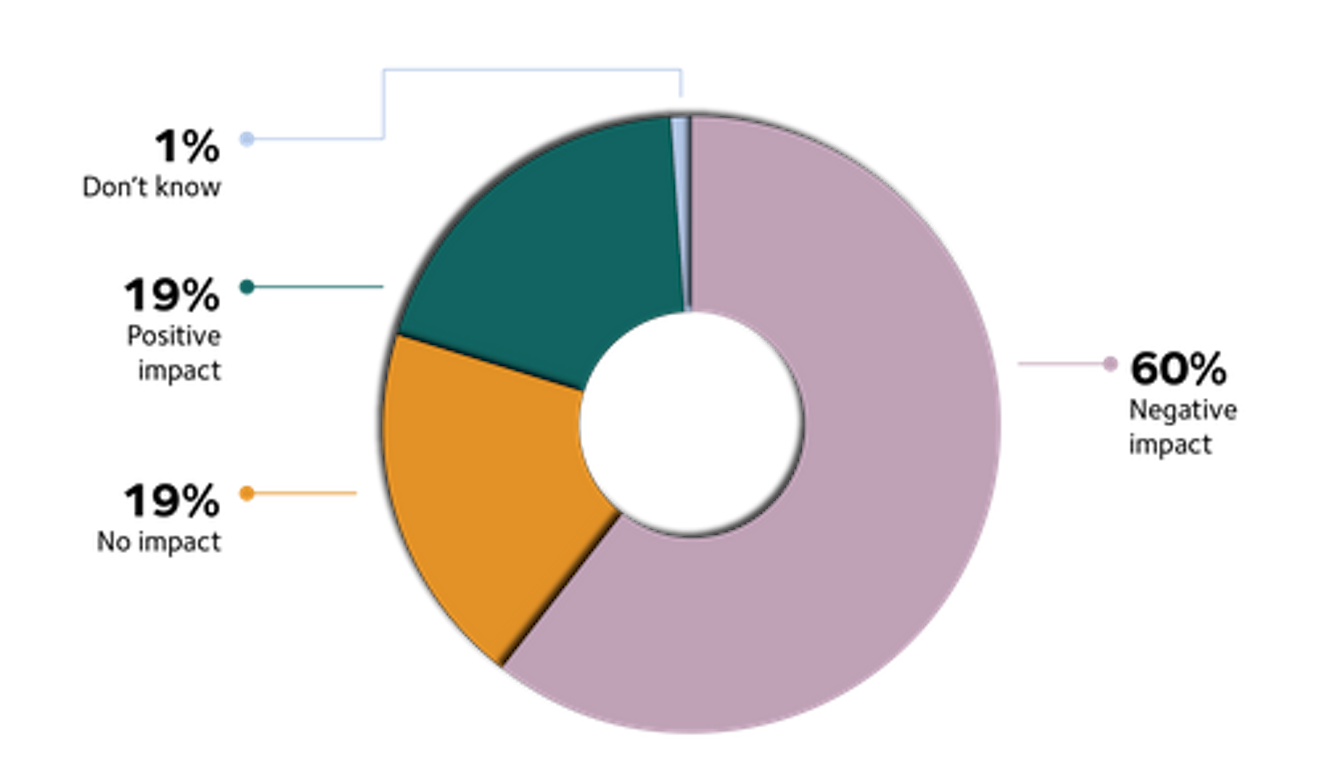
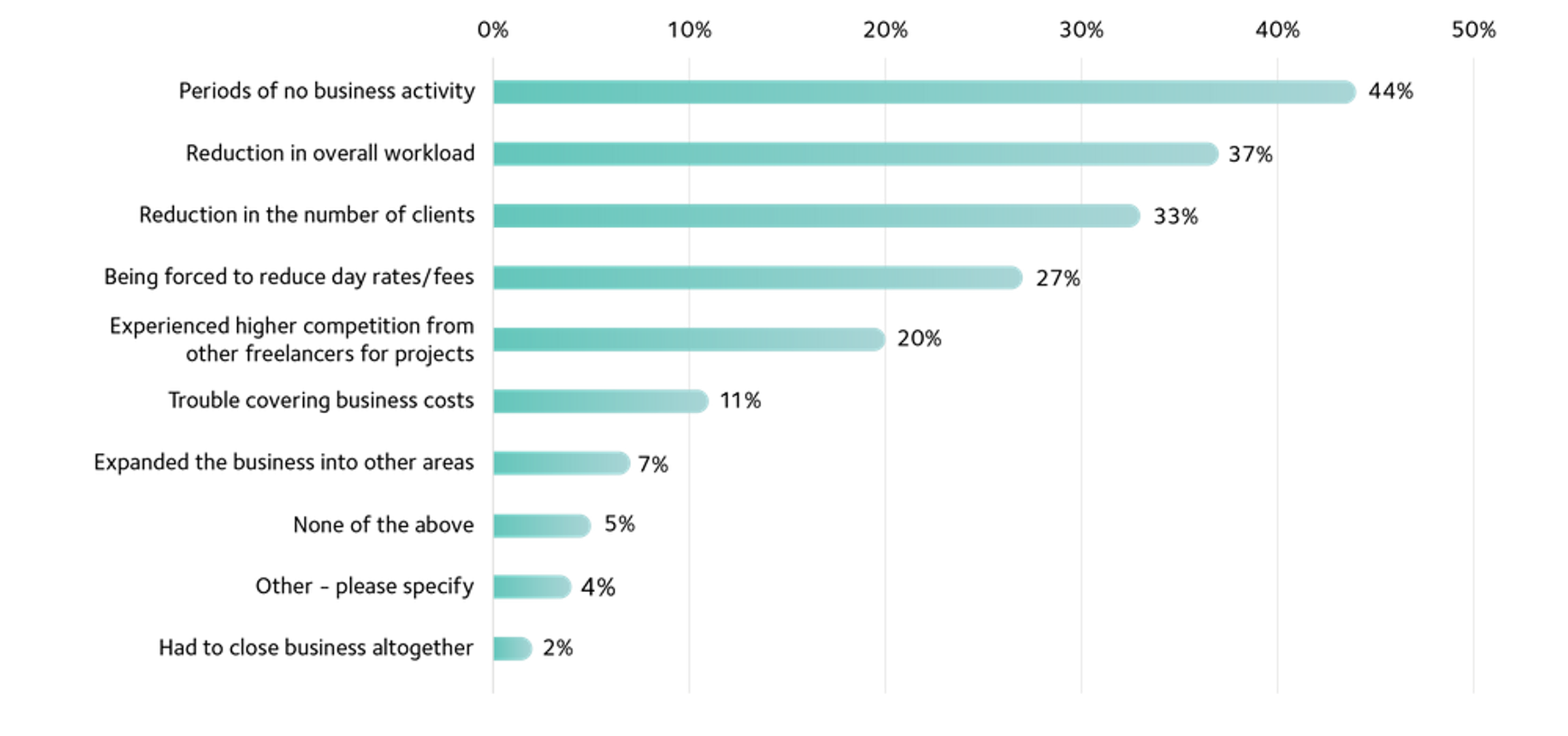
Despite the far-ranging negative impact of the pandemic on the sector, 19 per cent of freelancers actually indicated that the pandemic had had a positive impact on their businesses. One explanation for this is that these freelancers may work in sectors that were largely unaffected by government restrictions or that they were able to adapt their businesses to mitigate the negative effects of the pandemic.

Mental health of the self-employed
We know from research by the World Health Organisation that one key factor that can trigger mental health conditions is a reduction in earnings.10 It therefore seems likely that the reduction in freelancers' earnings caused by the pandemic could lead to a deterioration in their mental health.
IPSE research conducted in July 2020 revealed a significant drop in the proportion of freelancers reporting positive mental health since the beginning of the pandemic. The research showed that prior to the pandemic, 68 per cent of respondents reported that their mental health was either good or excellent. By July 2020 - after the onset of the pandemic and the damage to freelancers' businesses - this had fallen to 39 per cent.11 Nine months on, our latest research shows that 44 per cent of freelancers have good or excellent mental health. This shows a small increase in the number of freelancers with good mental health, but the fact that it remains significantly below pre-pandemic levels suggests long-term damage.
Current levels of mental health
Perhaps more concerning are the levels of poor mental health reported by the sector. Prior to the pandemic, only six per cent of freelancers reported that their mental health was poor or very poor. In July 2020, this figure rose to 26 per cent: a 349 per cent increase. Now, in March 2021 when the research was conducted, our most recent findings reveal that one in five (20%) freelancers continue to report that their current mental health is either poor or very poor.
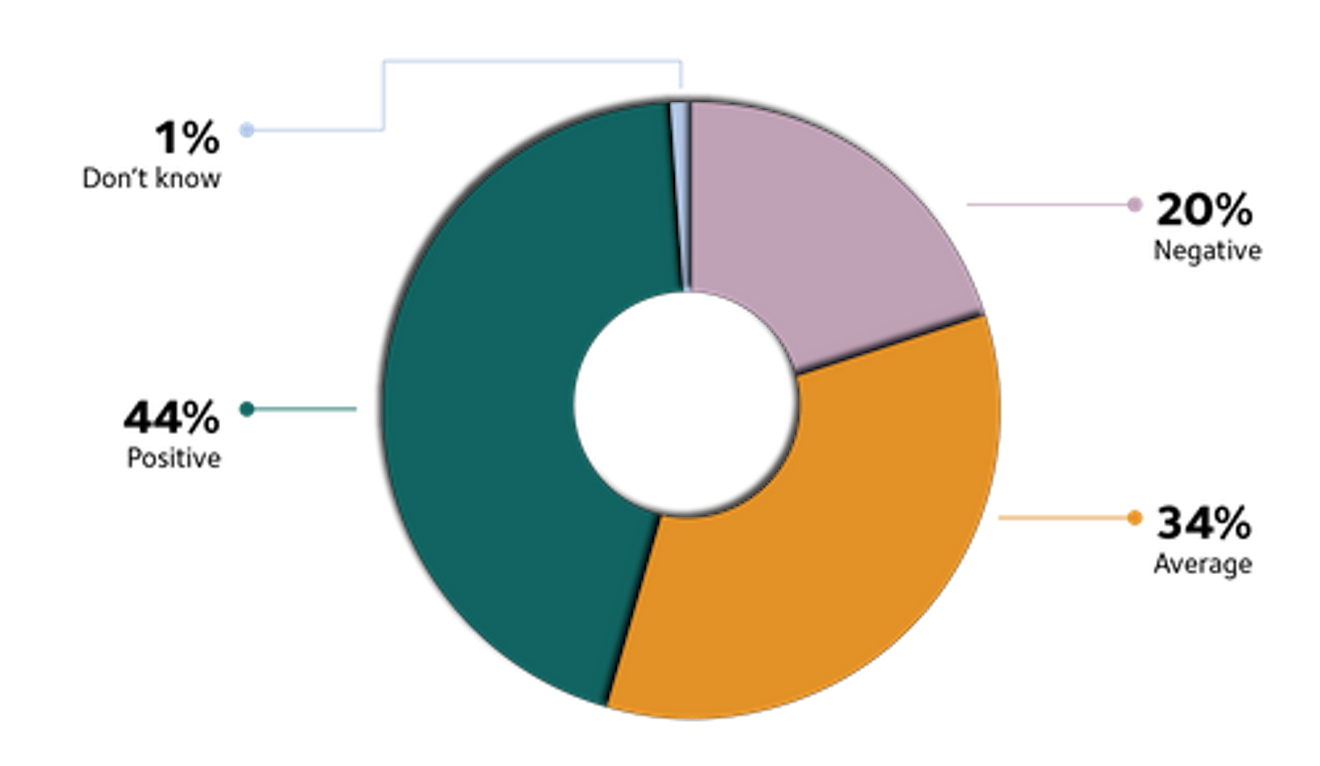
Change in mental health over last 12 months
More than half (52%) of freelancers also reported that their mental health has deteriorated over the past year. Worryingly, 13 per cent of freelancers reported that their mental health has significantly deteriorated, once again underlining the devastating impact of the pandemic on the mental health of some freelancers. This is in contrast to 31 per cent who reported no change over the last 12 months and 15 per cent who said that their mental health has actually slightly or significantly improved.
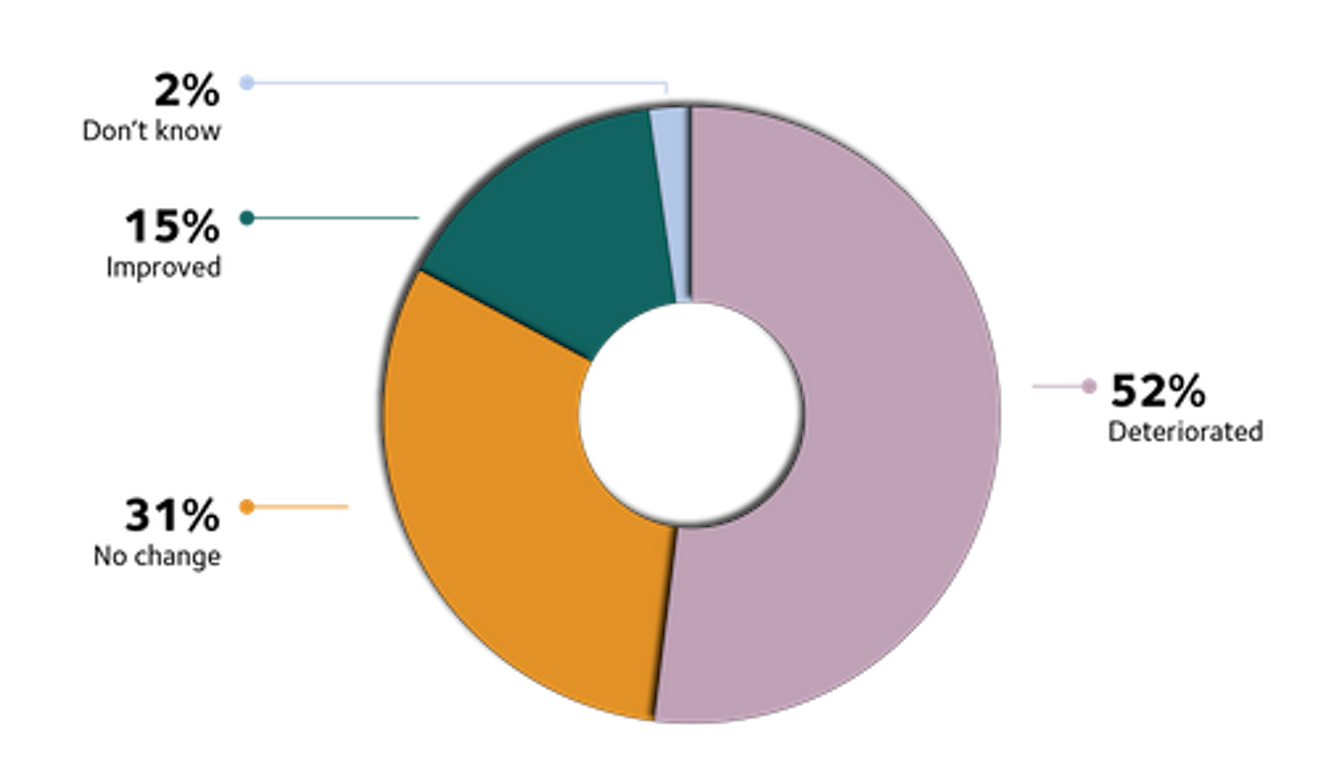
Looking at various demographic groups reveals some concerning differences. Of those who had been in self-employment for less than five years, 28 per cent reported that their current mental health was poor or very poor. As we know that mental health issues can be triggered by financial issues, one explanation for this could be that those newer to self-employment were originally ineligible for the government SEISS grants.
When looking at gender, we know that in July 2020, female freelancers were more likely to report poor or very poor mental health compared to males (33% compared to 22%).[12] This is in line with research that shows that women are more likely than men to report a common mental health problem.[13] However, the most recent findings show that in March 2021, male and female freelancers reported similar levels of poor mental health (22% of female freelancers and 19% of male freelancers). Interestingly this indicates that female freelancers have seen a significant reduction in poor mental health since July 2020 whereas men have remained largely stable.
Freelancers in the 40-59 age group were more likely to report a deterioration in their mental health over the last 12 months with 56 per stating that it had slightly or significantly deteriorated. This is significantly higher than those aged 60 and above (45%) and those under 40 (47%).
There were also significant differences depending on freelance business structure. Those operating through limited companies were more likely to report a deterioration in their mental health over the last 12 months compared to those operating as sole traders (54% compared to 46% respectively). Once again, this could be linked to a lack of government support as limited company directors were not eligible for the SEISS grant and many were left with little or no financial support throughout the pandemic.

The impact of poor mental health
Mental health affects all aspects of people’s lives including physical health, home life and work life to mention a few.
Looking at the experiences of those who reported poor mental health reveals that, in the last 12 months, over three quarters (77%) had experienced reduced energy levels and 71 per cent had trouble sleeping as a result. Worryingly, for 71 per cent of those reporting poor mental health, this translated into depression and anxiety and almost 70 per cent (69%) experienced an increase in negative thoughts. An additional 29 per cent also reported that they had suffered physical health problems as a result of poor mental health.
Concerningly, 60 per cent had experienced feelings of inadequacy or failure, or felt an overall lack of confidence while 57 per cent had lost interest in activities that were once enjoyable.
For many, poor mental health also had a negative impact on work-related aspects of their lives. Notably, three fifths reported that they felt unable to concentrate on work (61%) or reported reduced productivity (60%). One in seven freelancers with poor mental health (14%) also revealed that they had to delay or cancel projects as a result.
In general, there were very few demographic differences in the impacts of poor mental health on individuals, although there were some interesting differences between genders. Most notably, male freelancers were significantly more likely to suffer from an increase in negative thoughts (71%) compared to female freelancers (61%). On the contrary, female freelancers were more likely to report feelings of inadequacy or failure (74%) or reduced productivity (71%) compared to male freelancers (54% and 57% respectively). This backs up research prior to the pandemic that revealed that women were significantly more likely to report feelings of inadequacy or failure compared to men.14
Graph 2: Which of the following, if any, have you experienced as a result of poor mental health over the last 12 months?
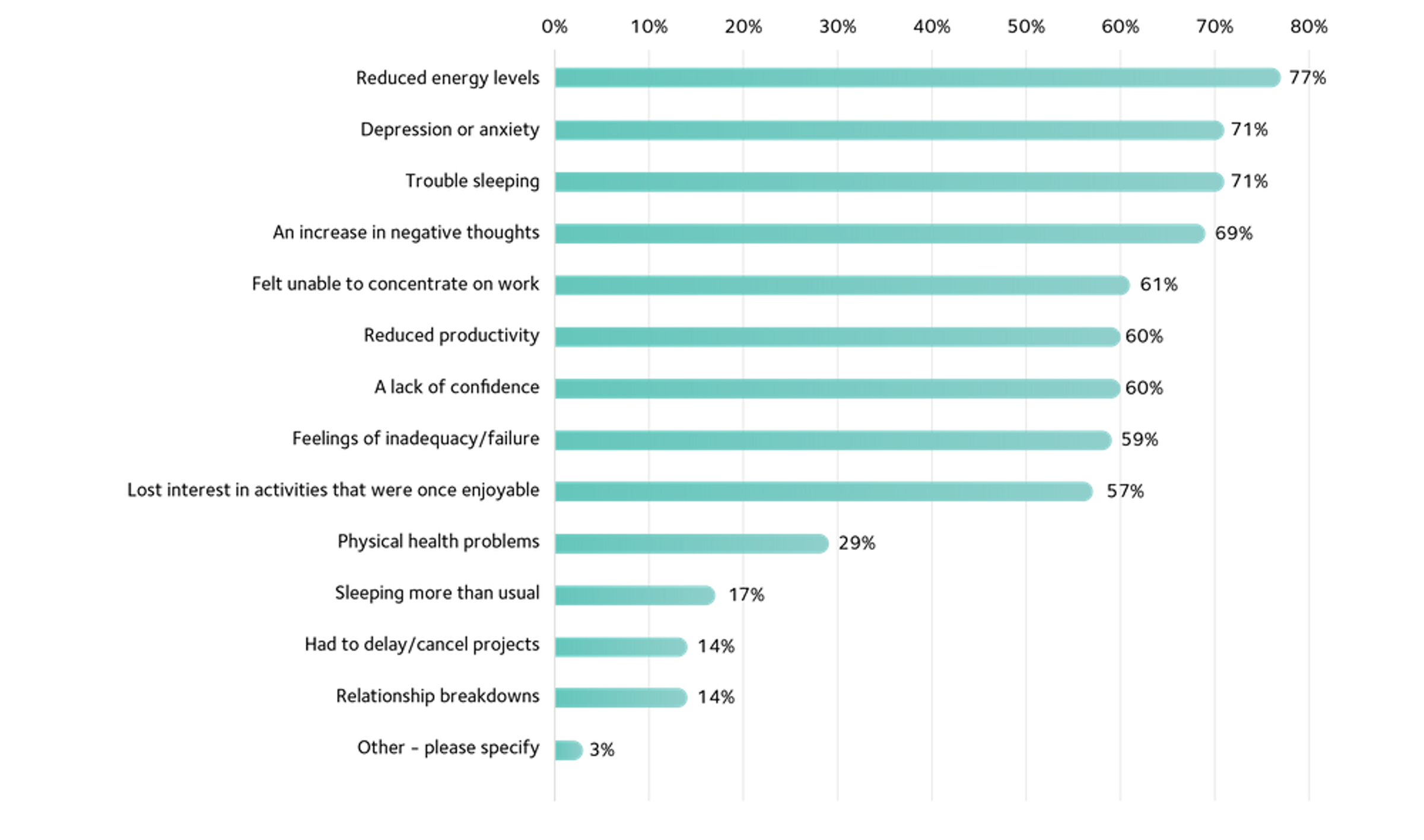

Taking care of mental health
In order to tackle declining mental health in the freelance community on a large scale, it is important to understand what measures freelancers themselves have adopted to take care of their mental health over the last 12 months.
The research revealed that the key things freelancers have done to maintain positive mental health include exercising outdoors or at home (65%), adopting a healthy diet (48%) and trying to get enough sleep (46%). These are all in line with NHS recommendations, which state that having a healthy diet, getting regular sleep, communicating with friends and family and exercising where possible can help those struggling with mental health.[15]
Other measures freelancers adopted to manage their mental health included spending time on hobbies and entertainment (46%), sharing thoughts and feelings with others (27%) and socialising with friends and family (23%).
Taking time off work (26%), taking time to plan workloads (24%) and networking with others (20%) were also strategies employed by over a fifth of freelancers to encourage positive mental health. However, although taking time off work can have a positive impact on freelancers’ mental health, we know from previous research that freelancers find it hard to take time off work, and 78 per cent say that when they do, they struggle to switch off entirely.16
Collaboration also played a role in supporting positive mental health: 14 per cent of freelancers sought to collaborate with other freelancers, while nine per cent had joined online groups or communities of freelancers for support in the last 12 months.
Interestingly, almost a fifth (19%) practiced mindfulness or meditation while one in ten (11%) directly sought access to resources about mental health and wellbeing to help maintain positive mental health.
Looking at age differences, exercising outdoors or at home was more popular for those aged over 50 (67%) compared to those under 50 (61%). There were also some differences across genders: female freelancers were more likely than their male counterparts to share their thoughts and feelings with others and also spend time on hobbies and entertainment (41% compared to 24% and 54% compared to 44% respectively).
Sole traders were more able to prioritise getting enough sleep in order to maintain positive mental health compared to company directors (54% compared to 45%). Similarly, sole traders were also more likely to spend time on hobbies and entertainment (56%) than limited company directors (43%).
Graph 3: Which of the following measures, if any, have you adopted to take care of your mental health over the last 12 months
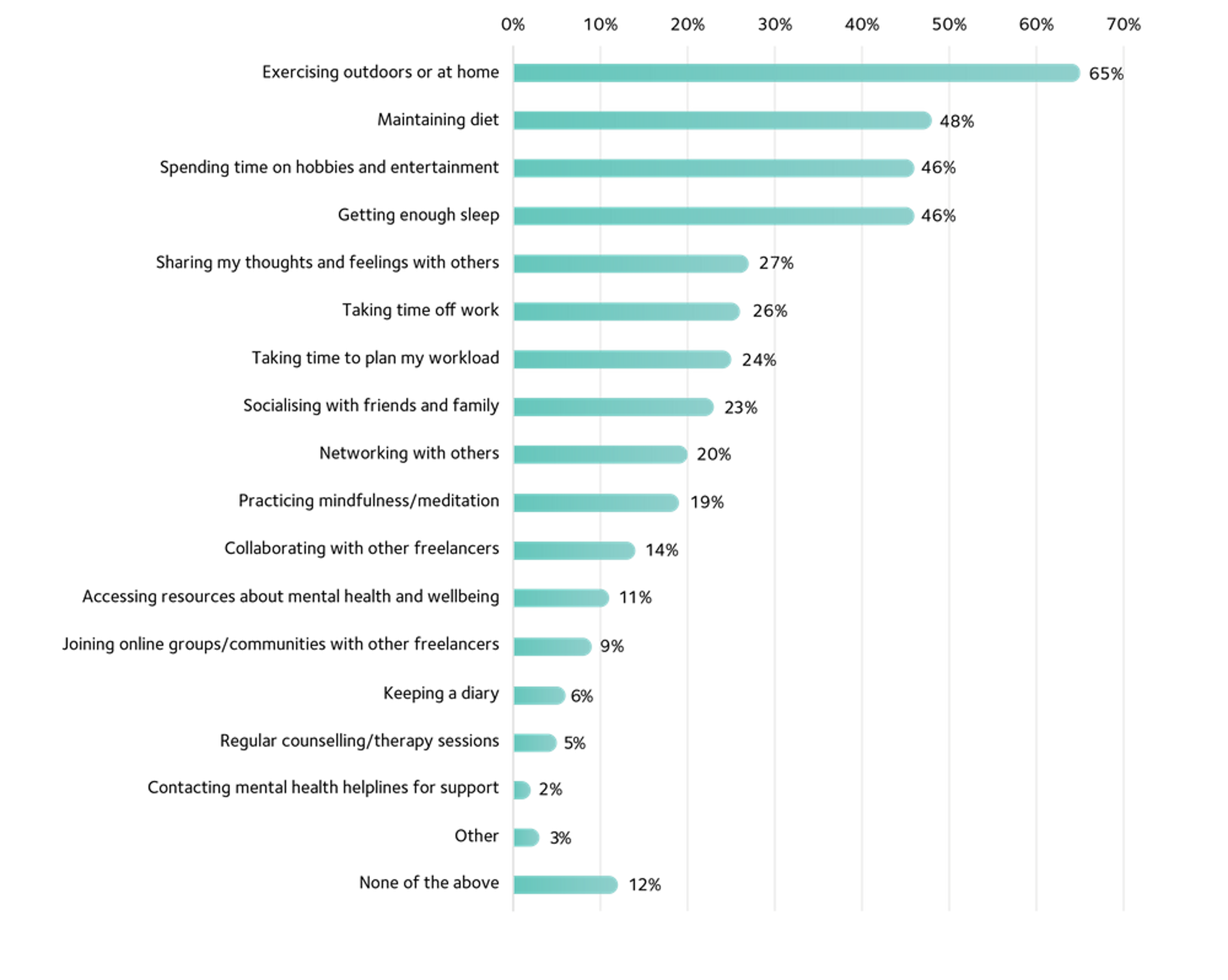

Growing confidence amid positive developments
In order to understand how freelancers feel about the future, the research asked about the impact of a range of government announcements on freelancers’ confidence in the future of their businesses. This included government announcements about the roadmap to ease restrictions, the vaccine roll-out and further announcements on financial support for the self-employed.
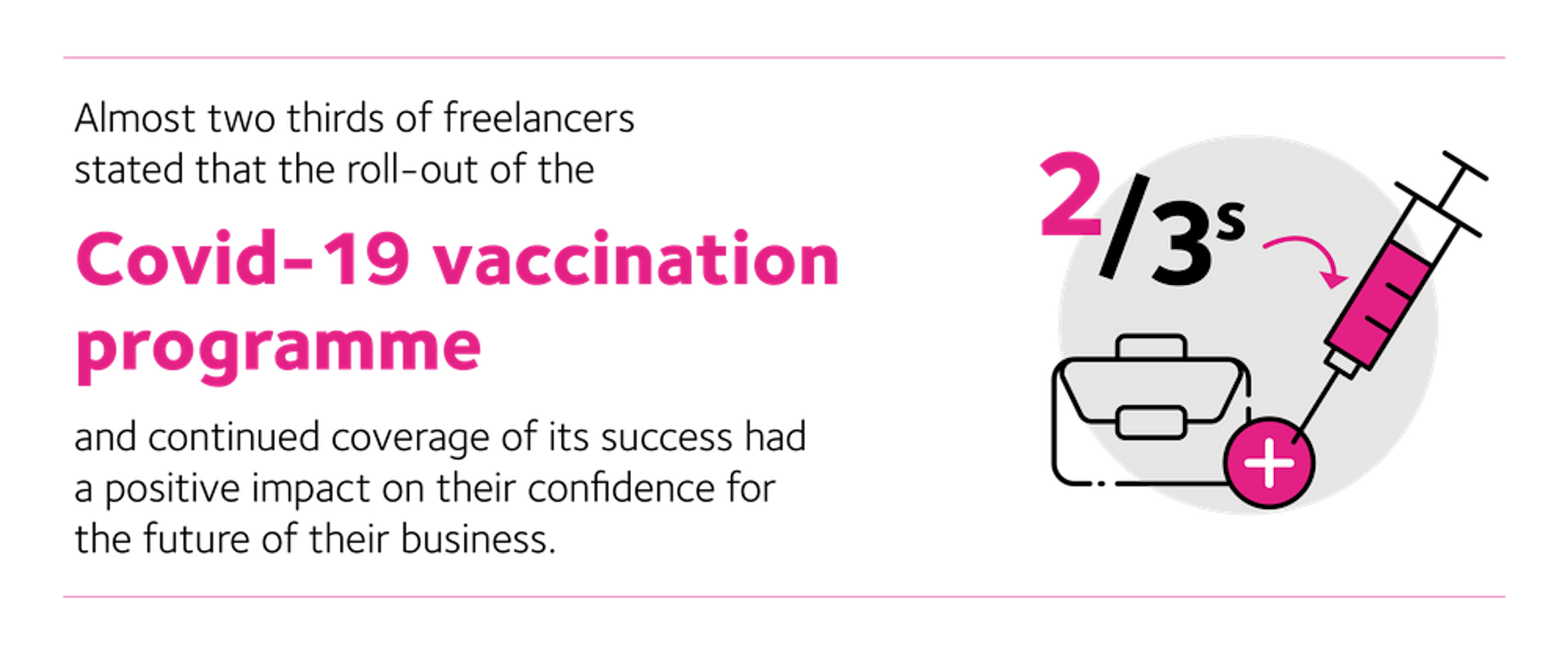
The roll-out of the Covid-19 vaccination programme and continued coverage of its success was the factor that had the most positive impact on freelancers. In fact, almost two thirds (65%) stated that this had a positive impact on their confidence in the future of their business. Many see the vaccine roll-out as the end to the coronavirus pandemic and a return to a more normal life. This closely aligns to other recent research which found that it is the vaccine roll-out in particular that has driven business confidence to its highest point in a year.[17] Interestingly however, men (67%) were more likely than women (58%) to state that the vaccine roll-out had had a positive impact on their confidence.
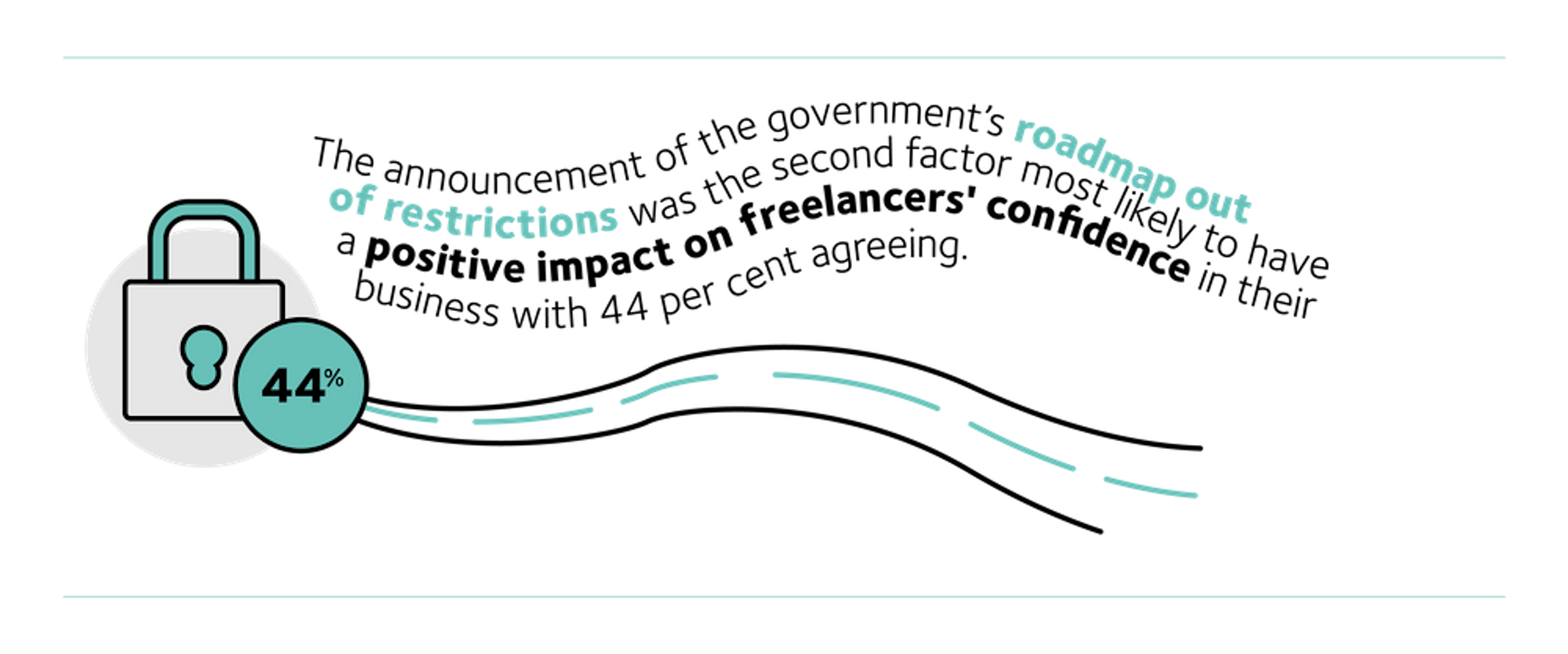

Conclusion and recommendations
Overall, it is clear that freelancers’ mental health continues to suffer from the impact of the pandemic. 60 per cent of freelancers said the pandemic had a negative impact on their business, and for over half (52%), this translated into a deterioration in their mental health over the last 12 months. It is therefore extremely concerning that one in five freelancers continue to report that their mental health is currently poor or very poor.
Lockdown restrictions clearly also had a significant impact on freelancers' businesses, with 44 per cent saying they experienced periods of no business activity and 37 saying they had seen a reduction in the number of clients. We can also see that certain groups - notably limited company directors - have experienced a greater deterioration in their mental health because they had to navigate the impact of the pandemic with little to no government support.
In order to manage their mental health, most freelancers appear to be largely following NHS guidelines on exercising outdoors (65%), maintaining a healthy diet (48%) and getting enough sleep (46%). However, only one in ten (11%) reported that they had directly accessed resources about mental health and wellbeing.
Looking to the future, the success of the vaccine roll-out (65%) and the government announcement of the roadmap out of restrictions (44%) have both been cited by freelancers as improving confidence in the future of their freelance business. However, it remains to be seen whether these positive developments will directly translate into improved mental health for freelancers as the UK begins to open up and restrictions are lifted.
Policy recommendations
Appendix

Latest news & opinions
IPSE's Josh Toovey explains why 2026 could bring renewed opportunity for the self-employed after a tough 2025 of limited projects and rising costs.

The festive season is a chance to celebrate another year of hard work, thank clients and colleagues, and relax after filing your tax returns for the last financia...

If you’re running a business, the festive season is often a busy time with client projects to finish, tax returns to submit, and plans to make for the following y...





